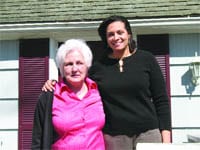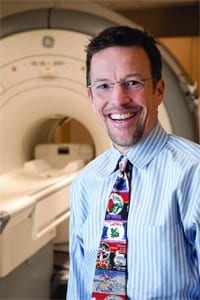Anti-coagulation Service At HMC Offers Fast, Personal Care
HOLYOKE — Michelle Nichols has long enjoyed eating vegetables high in Vitamin K, such as broccoli, dark leafy greens, spinach, and cauliflower.
So almost two years ago, when Holyoke Medical Center’s Dr. Morris Lainer prescribed Coumadin for her pulmonary embolism, she didn’t want to change her diet.
Luckily, she didn’t have to.
RN Christine O’Connor, who is certified in anti-coagulation, worked with Nichols for several months to properly adjust the level of Coumadin in her blood, integrating the daily habit of taking the blood-thinning pills into her lifestyle.
This meant a lot to Nichols, who now visits the anti-coagulation service on the hospital’s second floor just once a month for a quick finger prick and check-in.
“It’s such a nice service. It’s very flexible and personal. You can tell the nurses how you’re feeling and what’s going on in your life,” said Nichols. “They keep in regular contact with you. I think they make everybody feel really good when they go in there.”
The anti-coagulation service at Holyoke Medical Center (HMC) is quicker than waiting for laboratory results and less invasive, taking place in a warm and inviting environment focusing on education and “personal touch,” said O’Connor, clinical coordinator of the service.
“It’s designed to reduce Coumadin-related hospital visits because you can keep a close eye on the patient. The one-on-one education helps to make people understand how Coumadin functions in their bodies and what they can do to maintain it at a certain level.”
Patients who take Coumadin, also known in generic form as warfarin, are those who have certain heart conditions such as atrial fibrillation, making them more prone for heart attacks and/or strokes. Also, people who have blood clotting disorders and other diseases that can cause blood clots in the legs or lungs can benefit from the anti-coagulation effects of Coumadin, said O’Connor.
When a patient enters the second-floor office space of the anti-coagulation service for a test, O’Connor or registered nurse educator Theresa Ames measures the amount of Coumadin in the patient’s blood through a simple finger-prick test using the CoaguCheck machine.
Within one minute, they have results and can adjust the amount of Coumadin a patient is taking by 10{06cf2b9696b159f874511d23dbc893eb1ac83014175ed30550cfff22781411e5} or 15{06cf2b9696b159f874511d23dbc893eb1ac83014175ed30550cfff22781411e5}, to keep the dosage level within that individual’s therapeutic range.
Sitting at small desks lit with lamps rather than overhead lighting, O’Connor and Ames work personally with each of the 475 patients they have seen since the service was founded two years ago, said O’Connor, who emphasizes the importance of educating patients about their medication.
Education includes identifying the signs and symptoms of bleeding and blood clotting, the importance of diet, exercise, stress, and any other medications that can affect the results of Coumadin, said O’Connor.
While a patient new to Coumadin would initially visit the service twice weekly, those on the medication for an extended period visit every three weeks to one month. Patients are referred to the anti-coagulation service at HMC by one of 32 physicians from throughout the region, each of whom receives a monthly written report from O’Connor and Ames on every patient’s progress with Coumadin.
The service is growing at a rate of five or six new patients a week, said O’Connor, a tribute to its success.
“We offer such a non-threatening environment,” she said. “I think the patients really like it.”




Comments are closed.